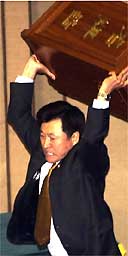There were remarkable scenes in South Korea's parliament today as supporters of the president, Roh Moo-hyun, struggled in vain to prevent him being stripped of his powers in an unprecedented impeachment vote.
Mr Roh was forced to step down after hours of scuffles and protests both inside and outside the national assembly in the capital, Seoul.
The opposition-controlled assembly decided by 193 votes to 2 in favour of impeachment. The bill was prompted by Mr Roh's refusal to apologise for breaching a presidential impartiality law last month, when he wished his political supporters well in advance of the coming general election.
The pro-Roh Uri party, whose members had to be removed by security guards when they tried to block the vote by commandeering the podium in the voting chamber, said its 47 MPs would resign in protest.
Meanwhile, thousands of Roh supporters gathered near the assembly and the headquarters of the main opposition Grand National party to decry the impeachment as a "mutiny".
The protests culminated in one demonstrator setting himself on fire and another trying to smash his car into the assembly building.
Mr Roh's powers are now suspended pending a final ruling by the constitutional court on the vote. That process could take up to six months, during which time the prime minister, Goh Kun, will take on all presidential responsibilities.
These include his role as commander in chief of South Korea's 650,000-strong military, which is lined up against communist North Korea's 1.1 million troops across the world's most heavily armed border.
One of Mr Goh's first moves, prompted by widespread unrest over Mr Roh's impeachment, was to put the military and police on heightened alert.
"The people feel unease because the impeachment bill was passed at a time when the economy faces difficulties," Mr Goh said. "The cabinet and all government officials must do all they can to stabilise the people's lives and ensure that the country's international credibility will not be damaged."
Mr Roh's election campaign was based on the promise of better relations with communist North Korea and a more equal footing with the country's biggest ally, the US.
The decision to remove him is likely to have a negative impact on the South Korean government at a time when the country is struggling to resolve a nuclear standoff with North Korea and revive a faltering economy.
However, his 13-month tenure was dogged by corruption scandals, and today's vote was a crowning embarrassment for the feisty, independent leader.
This is the first time South Korea's parliament has impeached a president. The move came after the National Elections Commission ruled last week that Mr Roh had engaged in illegal electioneering, but that the infraction was minor and did not warrant criminal charges.
Even before the impeachment, Mr Roh's credibility had been undermined by corruption scandals within his administration. In December, three of his former aides were indicted on charges of collecting illicit funds, from Samsung, LG and other companies, for the December 2002 presidential campaign.
In a brief statement issued by Mr Roh's presidential office, the administration said it would subject itself to "the judgment of history and the people".
